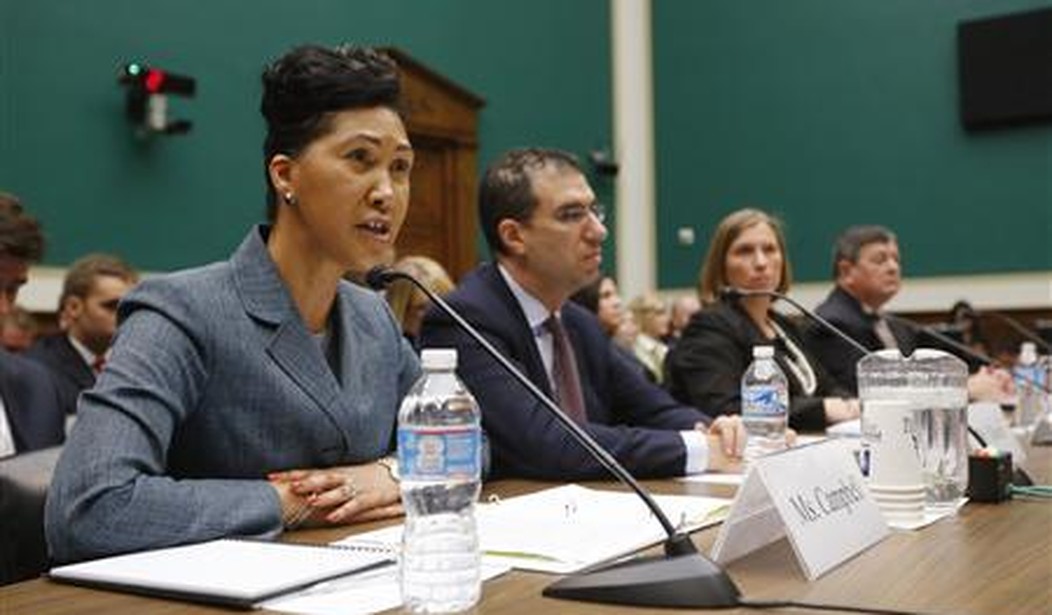WASHINGTON – Contractors who worked on the troubled Obamacare website tried to dodge bullets amid political crossfire at a House Energy and Commerce Committee hearing Thursday.
In her opening statement Cheryl Campbell, senior vice president of CGI Federal, took partial blame for HealthCare.gov’s problems. But she also noted that the Centers for Medicare and Medicaid Services (CMS) was the “ultimate responsible party for the end-to-end performance” of the site.
CMS, an agency under the Department of Health and Human Services (HHS), was tasked with getting the online exchanges off the ground. The website, which Americans in 36 states can use to purchase their own health insurance plans, has come under scrutiny since it launched on Oct.1 for falling considerably short of expectations. Many users have had trouble signing on, getting accurate cost estimates, and completing enrollment on the website.
Campbell blamed a portion of the website created by another contractor, Quality Software Services (QSSI), for the initial bottleneck that prevented users from registering.
QSSI built part of the online registration system that crashed shortly after the Oct.1 launch and locked out many people for days. Andy Slavitt, representing QSSI’s parent company, countered that it was not the only one responsible for the registration system, which is now working. He blamed CMS, saying that a late decision to require consumers to create accounts before they could browse health plans contributed to the overload.
“This may have driven higher simultaneous usage of the registration system that wouldn’t have occurred if consumers could window-shop anonymously,” he said.
He said the change was made within 10 days of the rollout, and his company suggested more testing would be needed.
“All of the concerns that we had, which were mostly related to testing and the inability to get as much testing as we would’ve liked, we expressed to CMS throughout the project,” he said.
But Slavitt did not elaborate on what those concerns were.
Republicans have suggested the late switch requiring users to sign in was initiated by the White House to prevent browsers from experiencing “sticker shock” over the costs of the insurance policies. In a letter, chairman of the House Oversight and Government Reform Committee Darrell Issa (R-Calif.) accused the White House of injecting politics into decisions about the website. The GOP letter cites testimony from top officials at CGI.
“Did the White House ever order your company for political reasons to mask sticker shock of Obamacare by disabling this anonymous shopper function?” asked Rep. G.K. Butterfield (D-N.C.), referring to Issa’s letter.
“I don’t believe that members of CGI actually made those statements directly in that manner. I think they may have been taken out of context,” Campbell responded.
“And to my knowledge, no, the White House has not given us direct instructions,” she added.
When Chairman Fred Upton (R-Mich.) asked the contractors whether there were concerns the site was not ready to go live, Campbell said: “It was not our position to tell our client whether they should go live or not go live.”
“This is more than a website problem. And frankly, the website should have been the easy part,” Upton said. “This is a troubling fact, but we still don’t know the real picture, as the administration appears allergic to transparency.”
Republican committee members said the website problems are part of deeper flaws in the Affordable Care Act (ACA), and they accused the Obama administration of misleading Congress with repeated assurances that the rollout was on track.
“Either these officials were shockingly unaware of what was happening…or deliberately misleading our committee and the public,” Rep. Tim Murphy (R-Pa.) said.
Rep. Joe Barton (R-Texas) grilled Campbell on hidden language in the website’s source code, pointing out a line that reads, “You have no reasonable expectation of privacy regarding any communication or data transiting or stored on this information system.” Barton asked how that language could be compliant with the Health Insurance Portability and Accountability Act (HIPAA) of 1996. That law establishes national standards around sharing personal health information.
Campbell said she was aware of the language but it was CMS’s decision to include it.
“It may be their decision to hide it, but you’re the company that put this together. You’re telling every American, if you sign up with this or even attempt to, you have no reasonable expectation of privacy. That is a direct contradiction to HIPAA, and you know it,” Barton said.
Rep. Frank Pallone (D-N.J) retorted that HIPPA only applies when there is health information being provided.
“No health information is required in the application process. And why is that? Because pre-existing conditions don’t matter! So once again, here we have my Republican colleagues trying to scare everybody,” he said.
Pallone’s sentiment was echoed by many Democrats who defended the law.
“The Affordable Care Act is an enormous success with one obvious exception – it has a poorly designed website,” Ranking Member Henry Waxman (D-Calif.) said. “My Republican colleagues have been predicting that healthcare reform would be a disaster for three years now, and every time they’ve been wrong.”
They accused Republicans of trying to sabotage the ACA by voting more than 40 times to repeal the law, encouraging governors to obstruct implementation, and shutting down the government. They also noted that Medicare Part D had similar problems when it started, but Democrats joined their Republican colleagues to solve the issues.
“Let’s not forget what a mess it was and the significant problems seniors had with registering for the new benefits. But I also want to remind my colleagues on both sides of the aisle that the difficulties passed and were soon forgotten amid the success of Part D,” Rep. Diana DeGette (D-Colo.) said.
As the hearing grew more contentious, however, decorum broke down when Pallone referred to the hearing as a “monkey court” and “another cynical effort to repeal the ACA.”
“Republicans don’t have clean hands coming here. Their effort, obviously, isn’t to make this better, but to use the website and the glitches as an excuse to defund or repeal Obamacare,” he said.
“A lot of people don’t want the Affordable Care Act to work and they’re raising all of these specters,” DeGette said. “And this privacy issue is a specter.”
Rep. Anna Eshoo (D-Calif.) asked the witnesses whether the system was tested before launch. Campbell said each company working on a component of the system and independent contractors did their own separate testing. She said CGI’s tests concluded the website worked properly, but did not work when it became part of the integrated system.
“Well, you knew it was going to be integrated. There are many subcontractors. That wasn’t a surprise,” she said. “Taxpayers have paid you a lot of money and you’re essentially saying to us everything is all right when it’s not.”
Health and Human Services Secretary Kathleen Sebelius will testify in front of the committee next week. HHS said she was unable to make the hearing today because of a “scheduling conflict.”
An Obama administration official, however, told Fox News that Sebelius planned to visit an ACA call center in Phoenix to meet with community leaders on outreach to those currently uninsured.









Join the conversation as a VIP Member